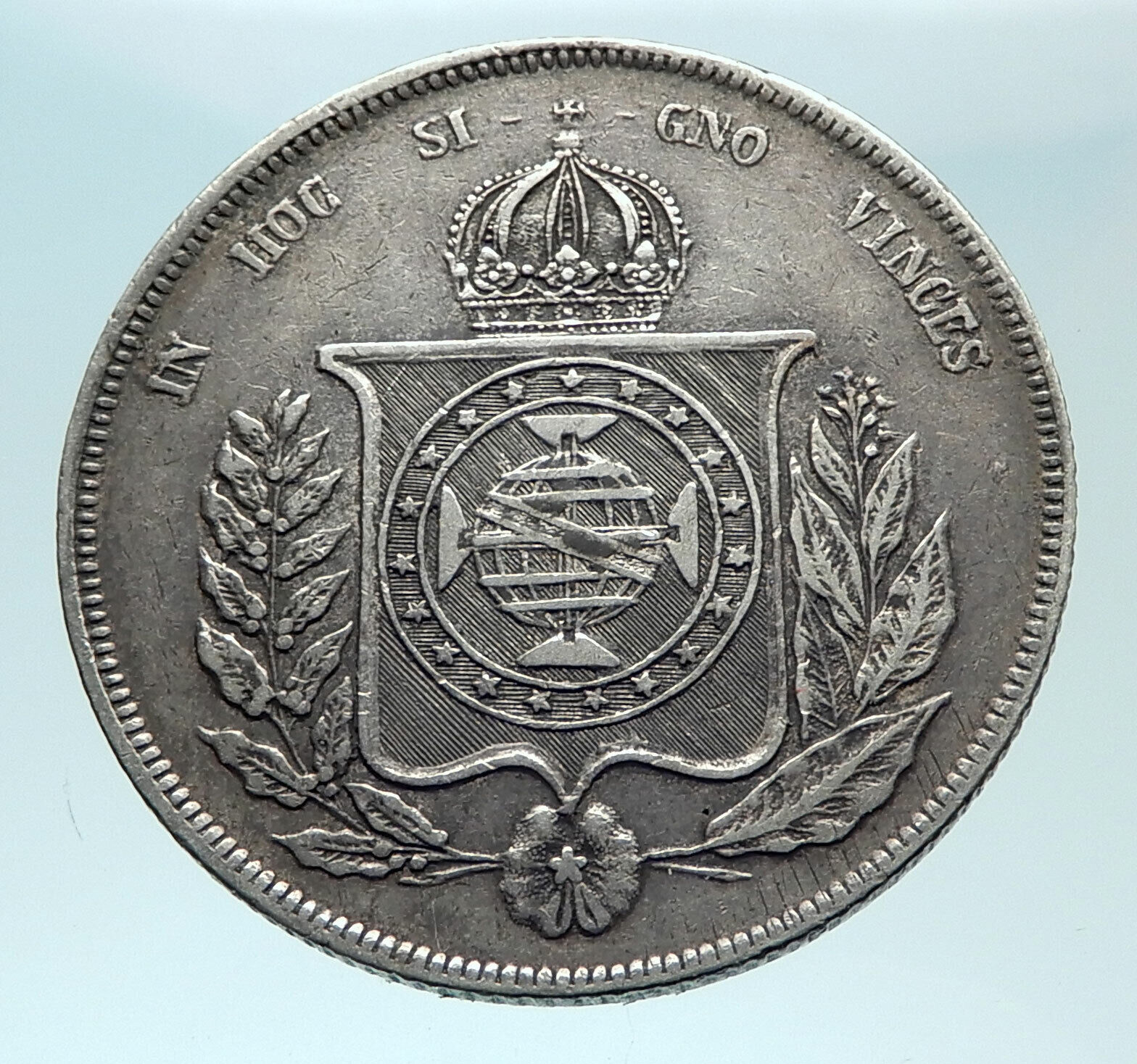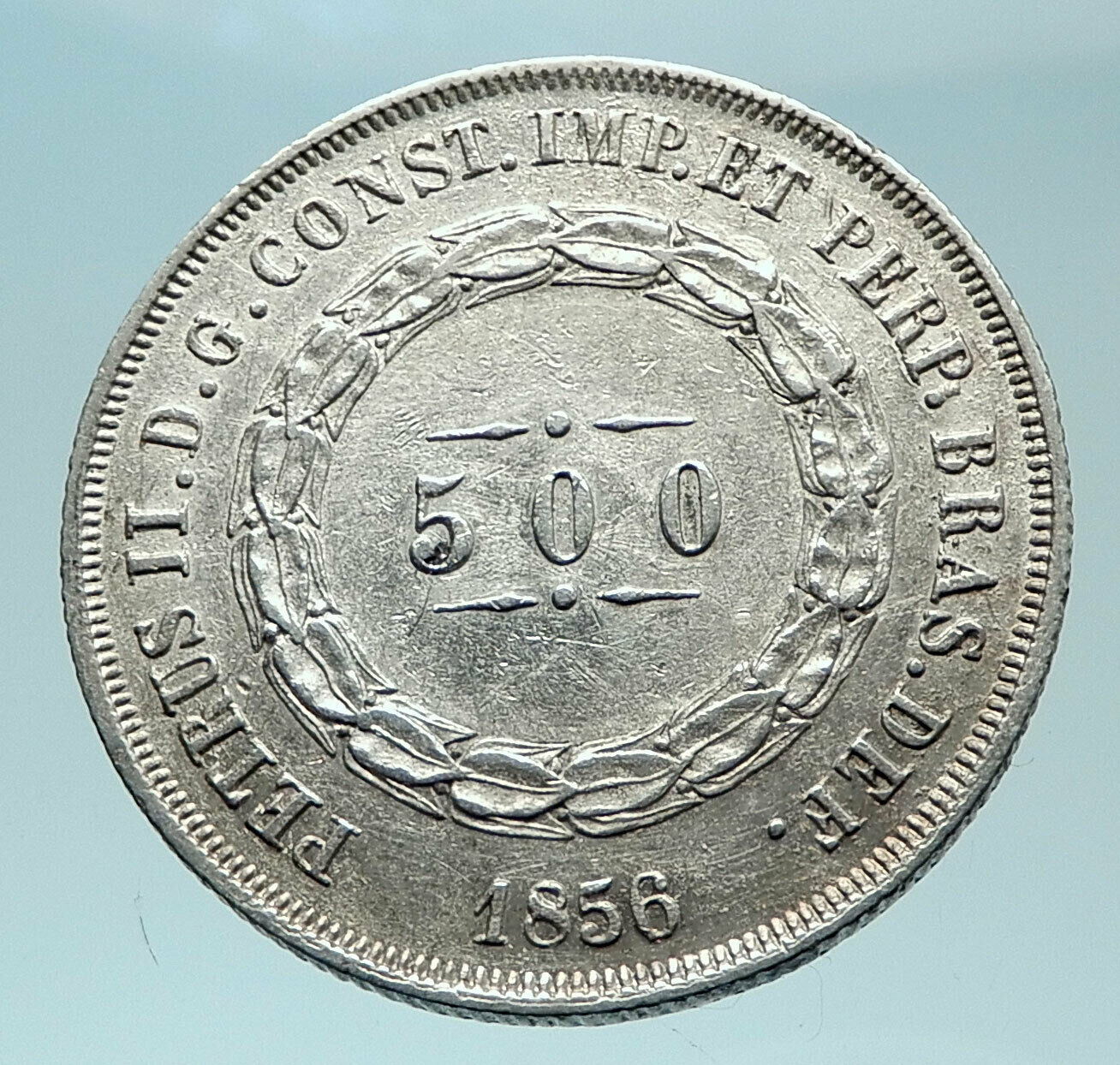|
Brazil – Portuguese Colonial
John (Joao) VI – King of Portugal and Brazil: 20 March 1816 – 10 March 1826
1816 Silver 960 Reis 39mm (26.77 grams) 0.903 Silver (0.7859 oz ASW)
Reference:
KM# 313 (1816)
JOANNES·D·G·PORT·BRAS·ET·ALG·P·REGENS· 18 16 ·960· , Crowned Coat-of-arms.
SUBQ· SIGN. NATA STAB. R, Initialed sash crosses globe within cross.
You are bidding on the exact item pictured, provided with a Certificate of Authenticity and Lifetime Guarantee of Authenticity.
Click here to see all coins of Brazil available for sale in my store
 John VI (Portuguese: João VI; 13 May 1767 – 10 March 1826), nicknamed “the Clement“, was King of the United Kingdom of Portugal, Brazil and the Algarves from 1816 to 1825. Although the United Kingdom over which he ruled ceased to exist de facto beginning in 1822, he remained its monarch de jure between 1822 and 1825. After the recognition of the independence of Brazil under the Treaty of Rio de Janeiro of 1825, he continued as King of Portugal until his death in 1826. Under the same treaty, he also became titular Emperor of Brazil for life, while his son, Pedro I of Brazil, was both de facto and de jure the monarch of the newly-independent country. John VI (Portuguese: João VI; 13 May 1767 – 10 March 1826), nicknamed “the Clement“, was King of the United Kingdom of Portugal, Brazil and the Algarves from 1816 to 1825. Although the United Kingdom over which he ruled ceased to exist de facto beginning in 1822, he remained its monarch de jure between 1822 and 1825. After the recognition of the independence of Brazil under the Treaty of Rio de Janeiro of 1825, he continued as King of Portugal until his death in 1826. Under the same treaty, he also became titular Emperor of Brazil for life, while his son, Pedro I of Brazil, was both de facto and de jure the monarch of the newly-independent country.
Born in Lisbon in 1767, the son of Maria I and Peter III of Portugal, he was originally an infante (prince, but not heir to the throne) of Portugal. He only became heir to the throne when his older brother José, Prince of Brazil, died of smallpox in 1788 at the age of 27.
Before his accession to the Portuguese throne, John VI bore the titles Duke of Braganza and Duke of Beja, as well as Prince of Brazil. From 1799, he served as prince regent of Portugal (and later, from 1815, as prince regent of the United Kingdom of Portugal, Brazil and the Algarves), due to the mental illness of his mother, Queen Maria I. In 1816, he succeeded his mother as monarch of the Portuguese Empire, with no real change in his authority, since he already possessed absolute powers as regent.
One of the last representatives of absolute monarchy in Europe, he lived during a turbulent period; his reign never saw a lasting peace. Throughout his period of rule, major powers, such as Spain, France and Great Britain, continually intervened in Portuguese affairs. Forced to flee to South America across the Atlantic Ocean into Brazil when troops of the Emperor Napoleon I invaded Portugal, he found himself faced there with liberal revolts; he was compelled to return to Europe amid new conflicts. His marriage was no less conflictual, as his wife, Carlota Joaquina of Spain, repeatedly conspired against her husband in favor of personal interests or those of her native Spain. He lost Brazil when his son Pedro declared independence, and his other son Miguel (later Miguel I of Portugal) led a rebellion that sought to depose him. According to recent scholarly research, his death may well have been caused by arsenic poisoning.
Notwithstanding these tribulations he left a lasting mark, especially in Brazil, where he helped to create numerous institutions and services that laid a foundation for national autonomy, and he is considered by many historians to be a true mastermind of the modern Brazilian state. Still, he has been widely (if unjustly) viewed as a cartoonish figure in Portuguese-Brazilian history, accused of laziness, lack of political acumen and constant indecision, and is often portrayed as physically grotesque.
.svg/250px-Brazil_(orthographic_projection).svg.png)  Brazil, officially the Federative Republic of Brazil, is the largest country in both South America and Latin America. As the world’s fifth-largest country by both area and population, it is the largest country to have Portuguese as an official language-and the only one in the Americas. Brazil, officially the Federative Republic of Brazil, is the largest country in both South America and Latin America. As the world’s fifth-largest country by both area and population, it is the largest country to have Portuguese as an official language-and the only one in the Americas.
 Bounded by the Atlantic Ocean on the east, Brazil has a coastline of 7,491 km (4,655 mi). It borders all other South American countries except Ecuador and Chile and covers 47.3% of the continent’s land area. Its Amazon River basin includes a vast tropical forest, home to diverse wildlife, a variety of ecological systems, and extensive natural resources spanning numerous protected habitats. This unique environmental heritage makes Brazil one of 17 megadiverse countries, and is the subject of significant global interest and debate regarding deforestation and environmental protection. Bounded by the Atlantic Ocean on the east, Brazil has a coastline of 7,491 km (4,655 mi). It borders all other South American countries except Ecuador and Chile and covers 47.3% of the continent’s land area. Its Amazon River basin includes a vast tropical forest, home to diverse wildlife, a variety of ecological systems, and extensive natural resources spanning numerous protected habitats. This unique environmental heritage makes Brazil one of 17 megadiverse countries, and is the subject of significant global interest and debate regarding deforestation and environmental protection.
Brazil was inhabited by numerous tribal nations prior to the landing in 1500 of explorer Pedro Álvares Cabral, who claimed the area for the Portuguese Empire. Brazil remained a Portuguese colony until 1808, when the capital of the empire was transferred from Lisbon to Rio de Janeiro. In 1815, the colony was elevated to the rank of kingdom upon the formation of the United Kingdom of Portugal, Brazil and the Algarves. Independence was achieved in 1822 with the creation of the Empire of Brazil, a unitary state governed under a constitutional monarchy and a parliamentary system. The ratification of the first constitution in 1824 led to the formation of a bicameral legislature, now called the National Congress. The country became a presidential republic in 1889 following a military coup d’état. An authoritarian military junta came to power in 1964 and ruled until 1985, after which civilian governance resumed. Brazil’s current constitution, formulated in 1988, defines it as a democratic federal republic. The federation is composed of the union of the Federal District, the 26 states, and the 5,570 municipalities.
Brazil’s economy is the world’s ninth-largest by nominal GDP and seventh-largest by GDP (PPP) as of 2015. A member of the BRICS group, Brazil until 2010 had one of the world’s fastest growing major economies, with its economic reforms giving the country new international recognition and influence. Brazil’s national development bank plays an important role for the country’s economic growth. Brazil is a founding member of the United Nations, the G20, BRICS, Unasul, Mercosul, Organization of American States, Organization of Ibero-American States, CPLP, and the Latin Union. Brazil is a regional power in Latin America and a middle power in international affairs, with some analysts identifying it as an emerging global power. One of the world’s major breadbaskets, Brazil has been the largest producer of coffee for the last 150 years.
|





 John VI (Portuguese: João VI; 13 May 1767 – 10 March 1826), nicknamed “the Clement“, was King of the United Kingdom of Portugal, Brazil and the Algarves from 1816 to 1825. Although the United Kingdom over which he ruled ceased to exist de facto beginning in 1822, he remained its monarch de jure between 1822 and 1825. After the recognition of the independence of Brazil under the Treaty of Rio de Janeiro of 1825, he continued as King of Portugal until his death in 1826. Under the same treaty, he also became titular Emperor of Brazil for life, while his son, Pedro I of Brazil, was both de facto and de jure the monarch of the newly-independent country.
John VI (Portuguese: João VI; 13 May 1767 – 10 March 1826), nicknamed “the Clement“, was King of the United Kingdom of Portugal, Brazil and the Algarves from 1816 to 1825. Although the United Kingdom over which he ruled ceased to exist de facto beginning in 1822, he remained its monarch de jure between 1822 and 1825. After the recognition of the independence of Brazil under the Treaty of Rio de Janeiro of 1825, he continued as King of Portugal until his death in 1826. Under the same treaty, he also became titular Emperor of Brazil for life, while his son, Pedro I of Brazil, was both de facto and de jure the monarch of the newly-independent country. .svg/250px-Brazil_(orthographic_projection).svg.png)
 Brazil, officially the Federative Republic of Brazil, is the largest country in both South America and Latin America. As the world’s fifth-largest country by both area and population, it is the largest country to have Portuguese as an official language-and the only one in the Americas.
Brazil, officially the Federative Republic of Brazil, is the largest country in both South America and Latin America. As the world’s fifth-largest country by both area and population, it is the largest country to have Portuguese as an official language-and the only one in the Americas. Bounded by the Atlantic Ocean on the east, Brazil has a coastline of 7,491 km (4,655 mi). It borders all other South American countries except Ecuador and Chile and covers 47.3% of the continent’s land area. Its Amazon River basin includes a vast tropical forest, home to diverse wildlife, a variety of ecological systems, and extensive natural resources spanning numerous protected habitats. This unique environmental heritage makes Brazil one of 17 megadiverse countries, and is the subject of significant global interest and debate regarding deforestation and environmental protection.
Bounded by the Atlantic Ocean on the east, Brazil has a coastline of 7,491 km (4,655 mi). It borders all other South American countries except Ecuador and Chile and covers 47.3% of the continent’s land area. Its Amazon River basin includes a vast tropical forest, home to diverse wildlife, a variety of ecological systems, and extensive natural resources spanning numerous protected habitats. This unique environmental heritage makes Brazil one of 17 megadiverse countries, and is the subject of significant global interest and debate regarding deforestation and environmental protection.




